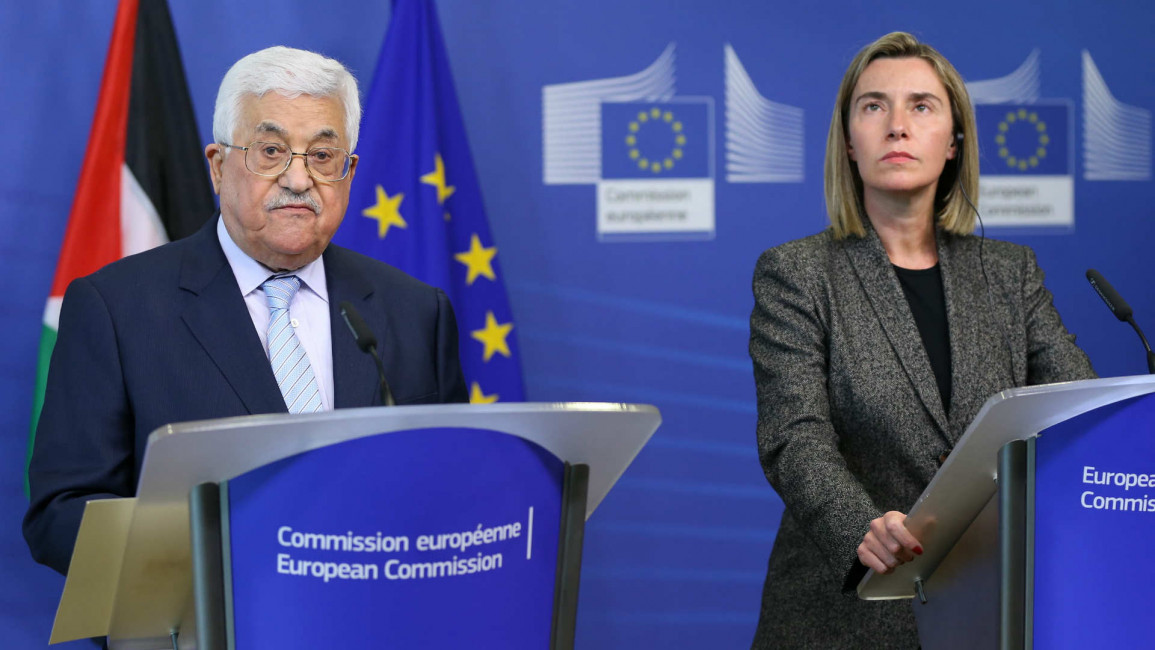
The UN and EU must do more to help Jerusalem
Both Mogherini and Guterres stated the US declaration would hinder the prospects of peace between Israel and the Palestinians and that the status of Jerusalem must be resolved through direct negotiations.
The exclusive emphasis on the so called "peace process" and on direct negotiations between Israel and the Palestinians proves one more time that the EU and the UN are not quite serious in their commitment to bring an end to this conflict: More importantly, it proves they are no longer neutral mediators in it.
Neutrality is the key element in any mediation process. The language used by a mediator to frame the dispute serves as a testing ground for their neutrality.
The 'peace process'
In the context of the Israeli-Palestinian conflict, the use of the terminology "peace process" is simply biased. This terminology creates a false symmetry between Israel and Palestine when such symmetry does not exist.
The Israeli-Palestinian conflict is not about a border dispute between two independent states. It is a conflict in which one state, Israel, subjects another people, the Palestinians, to military occupation, intertwined with an ever-expanding colonial project.
 |
In the two decades after the Oslo Accords, the number of Israeli settlers more than doubled from 262,500 settlers in 1993 to over 520,000 today |  |
The establishment of a Palestinian interim self-governing Authority that lacks any meaningful sovereignty powers from the 1993 Oslo Accords, does not suggest in any way that Israel and Palestine stand today on an equal footing.
If the EU or other international actors are sincere in their efforts to put an end to this conflict, they need to start describing the process appropriately: Ending a five decades military occupation and the decolonialization of the Palestinian territories occupied in 1967.
The use of the terminology "peace process" only perpetuates this volatile situation. The continuous military occupation of Palestinian Territories, the establishment of Jewish settlements in the heart of the West Bank and East Jerusalem, and the confiscation of Palestinian lands all constitute serious breaches of international law.
Twitter Post
|
According to the charity, OXFAM, in the two decades following the Oslo Accords, the number of Israeli settlers has more than doubled from 262,500 settlers in 1993 to over 520,000 across the West Bank today - including 200,000 in East Jerusalem.
Israel's continuous attempts to change the demography of Jerusalem started in 1967, when it annexed approximately 7,000 hectares of West Bank land to the municipal boundaries of West Jerusalem.
Subsequently, Israel held a census in the annexed area. Only Palestinians who were present at the census were given the status of "permanent resident"; those who were absent lost their right to return to their homes. Since then, Israel's policies in East Jerusalem have aimed at coercing Palestinians to leave the city.
According to B'Tselem, this goal has been achieved, inter alia, by limiting the lands available for the development or expansion of Palestinian neighborhoods in East Jerusalem.
Confiscated land
Since 1967, Israel has confiscated more than a third of the land annexed to West Jerusalem, most of it was privately owned by Palestinians. Israel has built 11 neighborhoods on those lands for the exclusive use of Jewish settlers.
Only 15 percent of lands in East Jerusalem are designated for residential use by Palestinian residents, although Palestinians currently constitute 40 percent of the city's population.
As a result of Israel's demographic and land policies, many families are forced to build housing units without official permits. Such housing units are systematically demolished by Israel.
Today, thousands of Palestinian families in East Jerusalem live under the constant threat of their homes and business being demolished. In addition, Palestinians who leave East Jerusalem due to this dire situation, risk losing their permanent residency.
Since 1967, Israel has revoked the permanent residency of 14,500 Palestinians from East Jerusalem. This gloomy reality was made possible, at least in part, due to the inaction of the international community.
Furthermore, the position expressed by Mogherini and Guterres falls short of their duty to uphold the rule of law. Both focus exclusively on the negative implications of the declaration for the peace process, ignoring entirely its incompatibility with international law.
 |
It is unfair to expect the Palestinians to negotiate with Israel and convince it to withdraw from the West Bank without any substantial support from the international community |  |
The Secretary-General and the EU should have stated clearly that: a) the annexation of East Jerusalem by Israel violates international law, and b) the acts of any State that supports or aids Israel in its illegal exercise of sovereignty in East Jerusalem are illegal too.
International law unequivocally prohibits the acquisition of land by war. On November 22, 1967, the Security Council unanimously adopted resolution 242, which emphasized the inadmissibility of acquisition of land by war and called for the withdrawal of Israel from all territories it occupied in June of 1967.
Read more: Trump's Jerusalem announcement will only fuel repression of Palestinians
Since the occupation of East Jerusalem, Israel has employed different measures and tactics to change the status of the city and to alter its demographic composition. 
These measures were condemned by the Security Council in a number of resolutions, emphasizing that "all legislative and administrative actions taken by Israel to change the status of the City of Jerusalem, including expropriation of land and properties, transfer of populations and legislation aimed at the incorporation of the occupied section, are totally invalid".
When the Knesset passed a "Basic Law", making Jerusalem the "complete and united" capital of Israel, the UN's Security Council declared the law null and void through resolution 478 because it violated international law.
Twitter Post
|
The resolution further emphasized that the Geneva Convention relative to the Protection of Civilian Persons in Time of War continues to apply to the Palestinian and other Arab territories occupied in 1967, including East Jerusalem.
Legal Consequences
The same legal principles where reiterated by the International Court of Justice (ICJ) in its advisory opinion on "the Legal Consequences of the Construction of a Wall in the Occupied Palestinian Territory".
In its opinion, the ICJ emphasized that the Palestinian People is entitled to exercise the right to self-determination, which constitutes a basic tenet of modern international law.
The exercise of this right imposes obligations "erga omnes" on states, or in other words obligations "towards all". Such obligations are attached to legal duties concerning all states which, by their very nature, can be held to "have a legal interest in their protection".
Therefore, the ICJ emphasized the duty of all states not to recognize illegal situations resulting from the breach of "erga omnes" obligations. States are also obliged not to give aid or assistance to maintain situations created by the violation of such obligations.
Any condemnation by the EU or Secretary-General Guterres that fails to address the illegality of the US declaration directly, and the duty of Israel to withdraw from all territories occupied in 1967, constitutes an additional blow to the rule of law at the international level.
It is unfair to expect the Palestinians to negotiate with Israel and convince it to withdraw from the West Bank without any substantial support from the international community.
The international community has an active role in guaranteeing every person on this planet is free to exercise their right to self-determination.
The rule of law, as the legal scholar, Jeremy Waldron puts it: "is one of the most important political ideals of our time" and "one of a cluster of ideals constitutive of modern political morality".
If this illegal and unjust situation continues, the Palestinians will not be only the only ones to lose - the moral authority and the legitimacy of the UN and EU are at stake as well. It is now time for the EU to stop beating around the bush.
Dr. Sonia Boulos obtained her JSD in international human rights law from the University of Notre Dame, USA. She works as assistant professor of international relations and law at the University of Antonio de Nebrija in Madrid.
Opinions expressed in this article remain those of the author and do not necessarily represent those of The New Arab, its editorial board or staff




